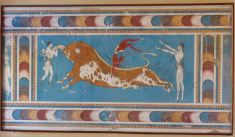The conference series "New Frontiers in Physics" aims to promote interdisciplinarity and cross-fertilization of ideas between different disciplines addressing fundamental physics. While different fields each face a distinct set of field-specific challenges in the coming decade, a significant set of commonalities has emerged in the technical nature of some of these challenges, or are underlying the fundamental concepts involved. A Grand Unified Theory should in principle reveal this underlying relationship.
For instance, techniques from string theory have become relevant in recent years for improving perturbative techniques in high energy physics or identifying material properties of non-abelian plasmas that share essential features with the systems studied in heavy-ion collisions. Fluctuation analyses of the cosmic microwave background involve techniques and concepts that are becoming increasingly relevant for the study of the quickly expanding little bangs in heavy-ion collisions. Cosmological models are developed in close interplay with searches for new physics at the LHC. There is a multitude of examples illustrating that crosstalk between neighbouring fields is relevant or even crucial for progress in either field.
The conference series "New Frontiers in Physics" aims at identifying interdisciplinary topics on which crosstalk between different disciplines of fundamental physics can contribute to further progress. The conference series aims at bringing together key scientists of different fields to discuss the state of the art and the nature of open questions in a language suitable for a physics educated interdisciplinary audience and to discuss avenues for further progress.
-
Main topics
While the main body of the conference builds mainly on the below-mentioned topics, presentations on yet different disciplines are invited and vary every year. Such topics include nuclear structure, atomic physics, plasma physics, physics applications (biophysics, medical science), biology, mathematics, computing science, etc.
-
High Energy Particle Physics
ASearches for new particles and new phenomena (Higgs boson, SUSY, top quarks, extra dimensions, flavour physics, precision electroweak measurements and others), hadron physics, and neutrino physics.
-
Heavy Ion Collisions and Critical Phenomena
BThe properties of QCD matter under extreme conditions and the QCD phase diagram. Branching out to neighbouring disciplines: Superconductivity, Neutron Stars, Quark Stars, Exotics.
-
Quantum Physics, Quantum Optics and Quantum Information
CQuantum Optics, Quantum Information, Foundations of Quantum Mechanics, Quantum information; Entanglement and the Universe: Black Holes and Cosmology, Quantum Non-Locality, Cold Atoms.
-
Cosmology, Astrophysics, Gravity, Mathematical Physics
DCosmic Microwave Background, Dark Energy, Gravitational waves, Dark Matter, Astroparticle Physics, Quantum Gravity, String Theory, Non-Commutative Geometry, Holography.
-
-
Workshops
Workshops and mini-Workshops will be also organized during the conference:
-
Workshop on Lattice Field Theory and Condensed Matter Physics
W1 -
Workshop on Physics of Exotic Nuclei
W2 -
Workshop on New physics paradigms after Higgs and gravitational wave discoveries
W3 -
Workshop on Higgs Physics
W4 -
Workshop on Physics at FAIR-NICA-SPS-BES/RHIC
W5 -
Workshop on Heavy Ion Physics
W6 -
Mini-workshop on Correlations and Fluctuations in Relativistic Heavy Ion Collisions
W7 -
Mini Workshop on Instruments and Methods in HEP
W8 -
Workshop on Future of Fundamental Physics
W9 -
Workshop on Heavy Neutral Leptons
W10 -
Mini-workshop on Machine Learning for Particle Physics
W11 -
Workshop on Astro-Cosmo-Gravity
W12 -
Workshop on Laser Fusion, a spin-off from heavy-ion collisions
W13 -
Workshop on QCD
W14
-
-
Special Sessions
-
Lepton-Nucleus scattering and Structure of the Nucleon
LNS -
Physics Education and Outreach
PEO -
Diversity and Inclusion
DI -
Extended Session
ES
-
-
Lectures
L -
Multidisciplinary session
OT
